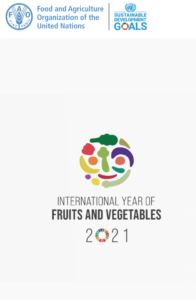Welcome to Phytogen for June 2021. Plans are well underway for a National ASPS Hybrid meeting on Thursday and Friday 25th and 26th November 2021. More details soon. Meanwhile, in this issue:
-
Report from 2020 Jan Anderson Award joint recipient, Dr Kristine Crous, Western Sydney University.
-
National ScienceWeek 2021 – 14th-22nd August
In 2020, we had joint recipients for the Jan Anderson Award. I hope you will enjoy reading about the wonderful work by Kristine Crous from Western Sydney University.
2020 Jan Anderson Award joint recipient – Dr. Kristine Crous, Western Sydney University.
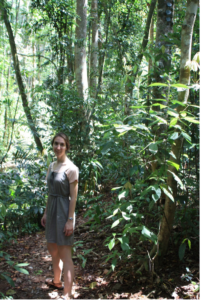
Fig.1: Kristine in tropical rainforest in Australia. |
Globally, the average temperature has increased by about 1°C since the Industrial revolution, and Australia has experienced a sustained period of warmer climate over the past 10 years including several of the hottest summers on record. While Australia is one of the drier continents in the world, there is also a lot of biodiversity with a unique set of plant and animal species. We all depend on plant species and their ecosystem services in several ways (i.e. food, clean air, ecotourism) but it is still unclear to what extent these services will change in a future warmer world. Understanding how plant function adjusts to these warmer conditions, in part caused by commensurate increases in atmospheric CO2 has been the focus of my research effort.
The Jan Anderson Award recognised the contributions that I made to understand plant responses to both elevated CO2 and climate warming, insights that contributed to several global datasets (Atkin et al., 2015; Kumarathunge et al., 2019; Smith et al., 2019) and to improve climate feedbacks represented in models (De Kauwe et al., 2013; Jiang et al., 2020).
I have conducted several experiments on Eucalyptus species to understand their physiological responses of photosynthesis (Crous et al. 2013) and respiration to climate warming (Crous et al. 2011, 2017). In an experiment using temperate and tropical provenances of two broadly distributed Eucalyptus species, I discovered that photosynthesis operates closer to the temperature optimum in tropical provenances than temperate provenances (Crous et al. 2018).
Given that there are large uncertainty regarding the temperature responses of rainforest species, I have measured the temperature response curves of photosynthesis and respiration in tropical and temperate rainforests to understand how close they are operating to their thermal optimum and how vulnerable these species are to further climate warming, as part of a DECRA award (Fig. 1).
Not only are Australian rainforests biodiverse, they have a direct link to the past, as many rainforest species have a Gondwanan lineage. So while these rainforests have seen some climate change in the past, the question is how will they cope with future climate warming?
To explore future climate conditions, my work has involved experimental set-ups such as the whole-tree chamber experiment (Fig. 2) or the Eucalyptus free-air CO2 enrichment experiments (EucFACE) (Fig. 3, 4), where elevated atmospheric CO2 or atmospheric warming treatments can be applied on large trees. Because trees have long lifespans, their ability to acclimate will likely be an important factor in determining their future.
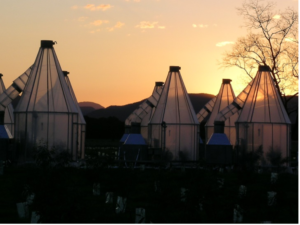 |
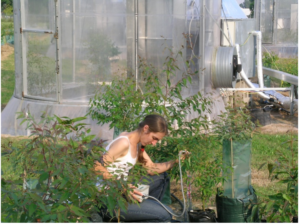 |
Fig. 2: The whole-tree chamber experiment at Western Sydney University in Richmond after completing diurnal measurements (left) and measurements on saplings outside the chambers (right).
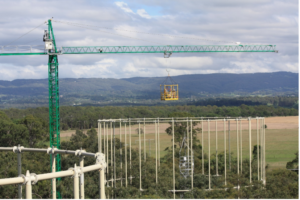
Fig. 3. Getting ready to do measurements in the Eucalyptus canopy at the EucFACE experiment at Western Sydney University (above) and measuring photosynthesis (right). |
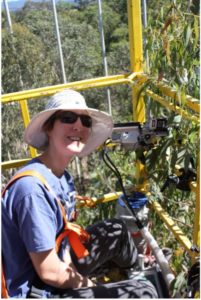 |
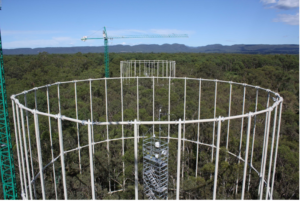
Fig. 4. EucFACE, two out of the six plots, view from above.
These large-scale experiments enable many collaborations examining different parts of an ecosystem in an attempt to understand the bigger picture including feedbacks of nutrients on the carbon cycle. While we are developing some understanding on how plants adjust to warmer temperatures, there are still many questions that are unclear, especially around temperature limits and plasticity among different plant species. Most models currently do no account for thermal acclimation of respiration and/or photosynthesis, with the risk of overestimating future responses of carbon uptake.
Recently, I have been elected as a ASPS representative for NSW in the discipline of whole plants. I hope that we can continue to link plant responses from molecular to ecosystem scales back to the whole plant and what it means for its survival, function and growth. Changes in response to biotic and abiotic factors in a plant’s environment drive natural selection which is part of how plants adapt to new conditions.
References
Atkin, O.K., Bloomfield, K.J., Reich, P.B., Tjoelker, M.G., Asner, G.P., Bonal, D., et al. (2015). Global variability in leaf respiration in relation to climate, plant functional types and leaf traits. New Phytologist 206(2), 614-636. doi: 10.1111/nph.13253.
Crous, K.Y., Drake, J.E., Aspinwall, M.J., Sharwood, R.E., Tjoelker, M.G., and Ghannoum, O. (2018). Photosynthetic capacity and leaf nitrogen decline along a controlled climate gradient in provenances of two widely distributed Eucalyptus species. Global change biology 24:4626-4644. doi: 10.1111/gcb.14330.
Crous, K.Y., Quentin, A.G., Lin, Y.S., Medlyn, B.E., Williams, D.G., Barton, C.V.M., et al. (2013). Photosynthesis of temperate Eucalyptus globulus trees outside their native range has limited adjustment to elevated CO2 and climate warming. Global Change Biology 19(12), 3790-3807. doi: 10.1111/gcb.12314.
Crous, K.Y., Wallin, G., Atkin, O.K., Uddling, J., and af Ekenstam, A. (2017). Acclimation of light and dark respiration to experimental and seasonal warming are mediated by changes in leaf nitrogen in Eucalyptus globulus. Tree Physiology 37(8), 1069-1083. doi: 10.1093/treephys/tpx052.
Crous, K.Y., Zaragoza-Castells, J., Loew, M., Ellsworth, D.S., Tissue, D.T., Tjoelker, M.G., et al. (2011). Seasonal acclimation of leaf respiration in Eucalyptus saligna trees: impacts of elevated atmospheric CO2 and summer drought. Global Change Biology 17(4), 1560-1576. doi: 10.1111/j.1365-2486.2010.02325.x.
De Kauwe, M.G., Medlyn, B.E., Zaehle, S., Walker, A.P., Dietze, M.C., Hickler, T., et al. (2013). Forest water use and water use efficiency at elevated CO2: a model-data intercomparison at two contrasting temperate forest FACE sites. Global Change Biology 19(6), 1759-1779. doi: 10.1111/gcb.12164.
Jiang, M., Medlyn, B.E., Drake, J.E., Duursma, R.A., Anderson, I.C., Barton, C.V.M., et al. (The fate of carbon in a mature forest under carbon dioxide enrichment). 2020. Nature accepted on Feb 5th 2020.
Kumarathunge, D.P., Medlyn, B.E., Drake, J.E., Tjoelker, M.G., Aspinwall, M.J., Battaglia, M., et al. (2019). Acclimation and adaptation components of the temperature dependence of plant photosynthesis at the global scale. New Phytologist 222(2), 768-784. doi: 10.1111/nph.15668.
Smith, N.G., Keenan, T.F., Colin Prentice, I., Wang, H., Wright, I.J., Niinemets, U., et al. (2019). Global photosynthetic capacity is optimized to the environment. Ecology Letters 22(3), 506-517. doi: 10.1111/ele.13210.
National Science Week 2021
Many events (August 14th-22nd 2021) are happening nationally and the ASPS is part of the action.
The theme for all the events we are organising is: “Plant Science Safeguarding Our Future Food Security: By the middle of the century there will be almost 10 billion people on Earth – an awful lot of mouths to feed, especially when a warming climate makes agriculture more challenging. Scientists may save the day by helping crop species adapt and thrive as growing conditions change.
The Australian Society of Plant Scientists is organising visits to laboratories and field sites across the country. Through talks, displays and demonstrations they give rare insight into the challenges faced by farmers, and how food scientists are working to help.”
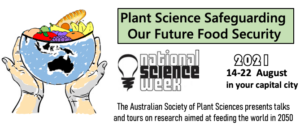
In coming weeks, look out for events posted to the “Find an Event” page on the National Science Week webpage, and also posted to ASPS’s twitter account (@asps_ozplants), which hopefully you are all following. Please be part of the action and post your events too.
Tweet to @asps_ozplants
July Phytogen will aim to provide a list of the ASPS events happening during August 2021.
Events
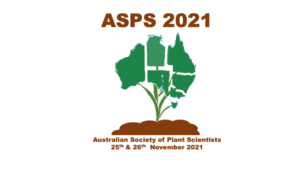
details soon………
Please login and check your ASPS membership is up to date. Encourage your colleagues and students to join ASPS.
Tweet to @asps_ozplants your news and upcoming events.




